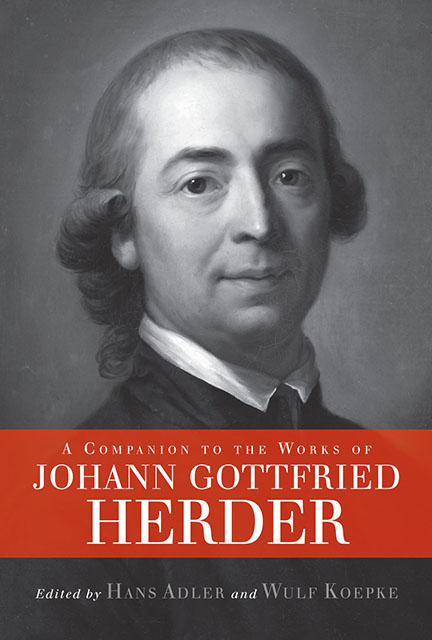Book contents
- Frontmatter
- Contents
- Acknowledgments
- List of Abbreviations
- Introduction
- 1 Herder's Life and Works
- 2 Herder's Epistemology
- 3 Herder and Historical Metanarrative: What's Philosophical about History?
- 4 Herder's Concept of Humanität
- 5 Herder and Language
- 6 Herder's Aesthetics and Poetics
- 7 Myth, Mythology, New Mythology
- 8 Particular Universals: Herder on National Literature, Popular Literature, and World Literature
- 9 Herder's Views on the Germans and Their Future Literature
- 10 Herder's Biblical Studies
- 11 Herder's Theology
- 12 Herder and Politics
- 13 Herder's Poetic Works, His Translations, and His Views on Poetry
- 14 Herder's Style
- 15 Herder as Critical Contemporary
- 16 Herder in Office: His Duties as Superintendent of Schools
- 17 Herder's Reception and Influence
- Bibliography
- Notes on the Contributors
- Index
15 - Herder as Critical Contemporary
Published online by Cambridge University Press: 28 February 2023
- Frontmatter
- Contents
- Acknowledgments
- List of Abbreviations
- Introduction
- 1 Herder's Life and Works
- 2 Herder's Epistemology
- 3 Herder and Historical Metanarrative: What's Philosophical about History?
- 4 Herder's Concept of Humanität
- 5 Herder and Language
- 6 Herder's Aesthetics and Poetics
- 7 Myth, Mythology, New Mythology
- 8 Particular Universals: Herder on National Literature, Popular Literature, and World Literature
- 9 Herder's Views on the Germans and Their Future Literature
- 10 Herder's Biblical Studies
- 11 Herder's Theology
- 12 Herder and Politics
- 13 Herder's Poetic Works, His Translations, and His Views on Poetry
- 14 Herder's Style
- 15 Herder as Critical Contemporary
- 16 Herder in Office: His Duties as Superintendent of Schools
- 17 Herder's Reception and Influence
- Bibliography
- Notes on the Contributors
- Index
Summary
TO AN EXTRAORDINARY and perhaps even singular degree, Herder's life and work are defined by the practice, function, and meaning of criticism. Despite the numerous other roles he occupied — and there were many: theologian, philosopher, linguist, historian, ethnographer, to name only a few — it was in his activity as a critic that Herder revealed his greatest strengths and arguably produced his most lasting achievements. Indeed, one might reasonably argue that Herder approached virtually everything he did as a critic, that his thinking and expression as a whole are a reflection or product of a fundamentally critical habit of mind. It was so much a part of his basic constitution that even Herder's personal relationships were inevitably affected by it, often negatively. Although Herder could be, and often was, generous, kind, and helpful to those around him, he was also capable of meting out biting sarcasm and caustic humor to an equal degree. Goethe, who first met Herder in Strasbourg in 1770 and was instrumental in bringing him to Weimar six years later, was often on the receiving end of Herder's prickliness, and once remarked in a private conversation many years after his death that “je mehr man Herdern geliebt, je mehr habe man sich von ihm entfernt, entfernt halten müssen, um ihn nicht totzuschlagen” (the more one loved Herder, the more one had to move away from him and keep one's distance, in order not to strike him dead). More diplomatically, in a written reminiscence of his friend, Goethe pointed to the inner contradictions that lay at the heart of Herder’s personality:
Herder war von Natur weich und zart, sein Streben mächtig und groß. Er mochte daher wirken oder gegenwirken, so geschah es immer mit einer gewissen Hast und Ungeduld; sodann war er mehr von dialektischem als constructivem Geiste. Daher der beständige ɛτɛρoς λόγoς gegen alles, was man vorbrachte. Ja, er konnte einen bitter auslachen, wenn man etwas mit Überzeugung wiederholte, welches er etwas kurz vorher als seine eigene Meinung gelehrt und mitgetheilt hatte.
[Herder was by nature soft and tender, his striving mighty and great. So whether he wanted to do something positive or work against some-thing, it occurred with a certain haste and impatience; in that way he was more of a dialectical than a constructive spirit. Therefore the constant ɛτɛρoς λόγoς against everything that one proposed.
- Type
- Chapter
- Information
- A Companion to the Works of Johann Gottfried Herder , pp. 351 - 372Publisher: Boydell & BrewerPrint publication year: 2009



